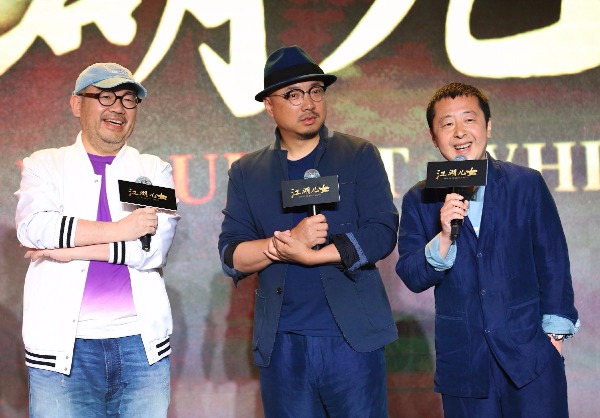 |
|
Jia Zhangke (right), with director Zhang Yibai (left) and director/actor Xu Zheng, announce the China-wide opening of Jia's new film, Ash Is Purest White, in September.[Photo provided to China Daily] |
Set from 2001 until present day, the 141-minute film follows a couple of one-time lovers through the huge transformation of China. Zhao's character, Qiao Qiao, is a goodhearted woman who gets sentenced to five years in jail for protecting her boyfriend Bin, a hooligan with high aspirations, played by Liao.
Any foreign viewer who wants to get the core of the movie should first understand the Chinese term jianghu, which literally translates to "river and lake".
In Jia's movie, the phrase's meaning is rooted in martial arts, where it refers to the lifestyle that the protagonists choose to lead. They are a sidelined, low-class minority who pursue power or money, as well as maintain justice in a system built more on human relations than law.
Chinese cinema has depicted a number of such roles, especially in Hong Kong's triad movies, with John Woo's iconic 1986 movie, A Better Tomorrow, as one of the most representative examples.
"Jianghu is a phrase very familiar to the domestic audience, but difficult to understand for their Western counterparts. After consulting with some critics, we decided to keep the pinyin spelling in the subtitles to convey its uniqueness in Chinese," says Jia.
"For me, jianghu is a legendary world, and it's also a distinctive way for the Chinese to socialize with each other. I believe it will resonate with Chinese audiences."
The script, in which Jia focuses more on the characters than the backdrop of an ever-shifting Chinese society-a shared theme in most of his early films-took him three years to write.
"The entire process of creation is very exciting. It reminds me of the small-town life, the romances there and the historic moments we have experienced," observes the Fengyang-born director. To pay homage to his youth, he shot two-thirds of the movie on film, rather than digitally.
His cast, most of whom are fellow directors, were keen to pay tribute to Jia's work.
Zhang, known for directing coming-of-age movies like Fleet of Time, recalls that despite the version he watched in Cannes having a soundtrack in the Shanxi dialect and being subtitled in French-both difficult for him to understand-he was touched by the romance between the protagonists.
Director-actor Xu says he was privileged to walk into "Jia's cinematic world", that he said for decades has provided a window into China through which Western moviegoers could enjoy the country.